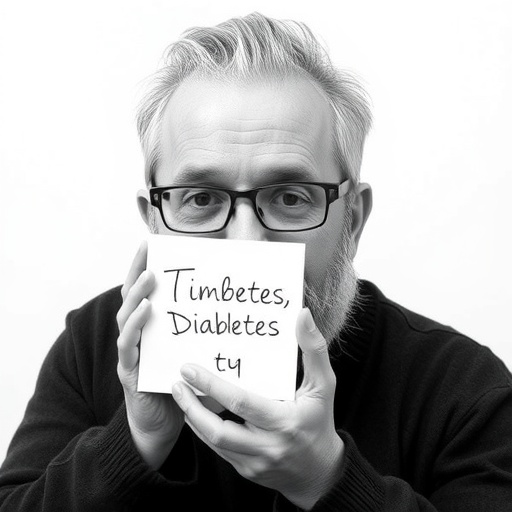In the realm of medical science, the persistence of stigma surrounding chronic illnesses continues to challenge patient care and health outcomes globally. One particularly pervasive yet under-examined form of stigma concerns diabetes, a condition affecting nearly a tenth of the world’s adult population and responsible for close to two million fatalities annually. Despite significant advances in understanding and managing diabetes, societal and even medical biases about the disease endure, complicating efforts to provide equitable and empathetic care. Recent groundbreaking research spearheaded by Kyoto University delves deeply into the awareness—and often the lack thereof—of diabetes stigma among those poised to become future healthcare providers: medical students and residents.
This extensive investigation represents the first real-world survey conducted in Japan, capturing the sentiments and awareness levels of over 900 medical trainees across prestigious institutions including Kyoto University and St Marianna University School of Medicine. The study’s timing, spanning mid-2024 to early 2025, uniquely situates it in an era where medical curricula are increasingly scrutinized for effectiveness in addressing both knowledge and social attitudes. The choice to include medical students at multiple stages of their education—from preclinical lectures through clinical practice—as well as residents, aimed to map how educational progression influences understanding and potential bias concerning diabetes.
Findings from this comprehensive survey reveal a troubling paradox. While more than half of the participants acknowledge the existence of stigma associated with diabetes, only a quarter demonstrate awareness of advocacy efforts aimed at combating this issue. Intriguingly, as medical students advance in their training, recognition of diabetes stigma increases, yet substantial misconceptions persist throughout all educational stages. This suggests that traditional medical education, even when it incorporates dedicated lectures on diabetes stigma, may not suffice in dismantling deeply rooted prejudices or misinformation.
Among the persistent misconceptions identified are beliefs inaccurately characterizing diabetes as invariably genetic or assuming uniformly reduced life expectancy for all patients. These erroneous notions were notably more prevalent among residents than among their student counterparts, hinting at the possibility that clinical exposure without adequate contextual education may inadvertently reinforce stereotypes rather than dispel them. This phenomenon raises critical questions about the manner and effectiveness of current clinical training environments and their impacts on shaping professional attitudes.
These insights underscore the potential risks of entering clinical practice equipped with incomplete or flawed understanding, wherein stigma not only continues but may become further entrenched due to real-world clinical experiences absent of robust educational frameworks. Such dynamics jeopardize the quality of patient care, as stigma can profoundly affect communication, trust, and treatment adherence, ultimately influencing health outcomes negatively.
The study’s authors advocate strongly for a re-examination and overhaul of medical education curricula, emphasizing the need to weave comprehensive stigma reduction strategies alongside clinical knowledge. This includes combining factual clinical information about diabetes with training in cultural competence, empathy, and patient-centered communication to challenge biases and foster advocacy mindsets in emerging physicians.
Researchers plan to extend their work longitudinally, with a follow-up survey targeting students later in their education to assess shifts in awareness post-clinical training. This longitudinal approach aims to illuminate how ongoing medical education impacts stigmatizing attitudes and the uptake of advocacy roles over time. Moreover, the team encourages replication and expansion of such research beyond Japan, particularly throughout the Western Pacific region, to capture diverse socio-medical contexts and to benchmark educational outcomes internationally.
The implications of this study transcend academic inquiry, touching upon public health policy and medical ethics. Diabetes stigma contributes to social isolation, psychological distress, and can impede proactive disease management among patients. By confronting these issues at the educational level, the next generation of healthcare providers can become agents of change, fostering environments where diabetes is understood accurately and compassionately, free from unwarranted assumptions.
This pioneering research not only illuminates gaps in awareness but also serves as a clarion call to educators, policymakers, and healthcare institutions worldwide. Addressing the perpetuation of stigma within the medical community is as much about enhancing scientific literacy as it is about nurturing humanity within healthcare. In the quest for a future where diabetes stigma is eradicated, educational reform emerges as both a necessary and promising frontier.
Recognizing the complex interplay of knowledge and prejudice, Kyoto University’s study elucidates an urgent need for integrated curricula that balance biomedical expertise with social sensitivity training. Only by doing so can medical curricula fulfill their mandates to prepare competent and compassionate physicians capable of delivering stigma-free care.
As this groundbreaking work gains traction, it paves the way for critical dialogue and transformative action within medical education systems globally. Through sustained efforts, enlightened training, and a broad commitment to inclusivity, the medical community can dismantle enduring diabetes stigma and promote equitable care that respects the dignity of all patients.
Subject of Research: People
Article Title: Awareness of diabetes stigma and advocacy among future physicians: insights from the first real-world survey among medical trainees in Japan
News Publication Date: 10 October 2025
Web References: http://dx.doi.org/10.1016/j.diabres.2025.112937
Image Credits: KyotoU / Mari Matsushiro
Keywords: Diabetes, Diseases and disorders, Doctor patient relationship, Health care, Clinical medicine




